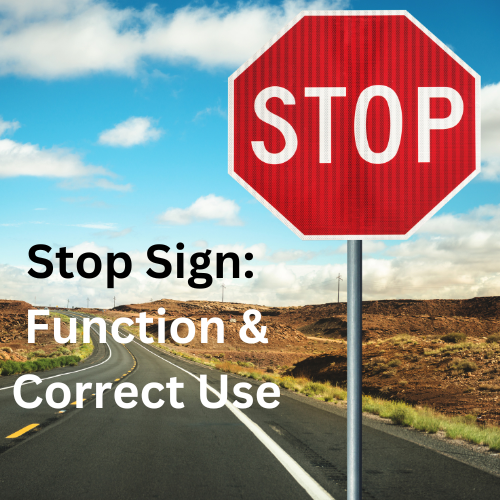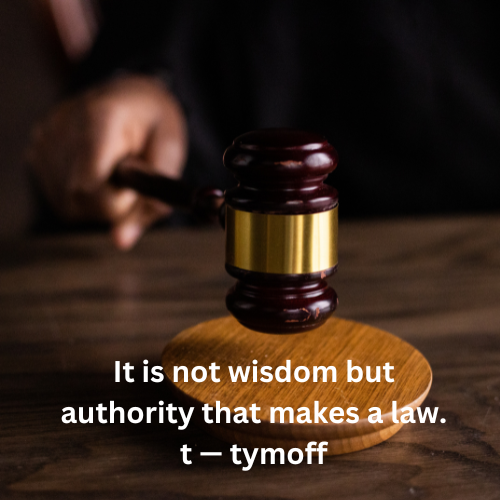The statement “it is not wisdom but authority that makes a law” captures the essence of how legal systems function across the world. While wisdom and ethical considerations are vital, the power to enforce and establish laws ultimately lies in the hands of those with authority. In this blog, we will explore the implications of this concept, its impact on legal systems, and the ongoing debate between wisdom and authority in lawmaking.
The Meaning Behind “It Is Not Wisdom But Authority That Makes a Law”
Understanding the phrase “it is not wisdom but authority that makes a law” requires examining the core elements of lawmaking. Laws are established rules that govern behavior and maintain order within society. While these laws ideally reflect wisdom and moral values, their actual enforcement depends on the authority vested in lawmakers and governing bodies.
The Role of Authority in Lawmaking
Authority plays a crucial role in the creation and enforcement of laws. Here’s why authority, rather than wisdom, is fundamental in lawmaking:
- Legislative Power: Legislative bodies, such as parliaments and congresses, have the legal authority to create laws. This power is granted by constitutions and legal frameworks, giving them the ability to enact and enforce laws.
- Enforcement Mechanisms: Without the backing of authority, laws would be ineffective. Police forces, judicial systems, and government agencies ensure compliance through enforcement.
- Legitimacy and Order: Authority provides the legitimacy needed for laws to be accepted and followed by the public. It maintains social order by ensuring that laws are respected and upheld.
Wisdom in Lawmaking: Its Role and Limitations
While “it is not wisdom but authority that makes a law” emphasizes authority’s role, wisdom is still essential in the lawmaking process. Here’s how wisdom influences lawmaking:
- Moral and Ethical Considerations: Wise lawmakers consider the moral and ethical implications of laws, striving to create just and fair regulations.
- Long-term Impact: Wisdom allows lawmakers to anticipate the long-term consequences of laws, ensuring they benefit society in the future.
- Public Good: Wise laws aim to promote the public good, protect individual rights, and enhance the well-being of the community.
However, wisdom alone cannot establish laws. Without the authority to implement and enforce these wise decisions, they remain mere ideals.
Historical Examples: Authority Over Wisdom
History provides numerous examples where “it is not wisdom but authority that makes a law” is evident:
- Ancient Rome: The Roman Empire’s laws were established by emperors and the Senate, who wielded significant authority. While some laws were wise and just, others reflected the whims of those in power.
- Modern Democracies: In contemporary democratic societies, elected representatives hold the authority to create laws. While these laws often reflect collective wisdom, their enforcement relies on the legal and political authority vested in these representatives.
The Balance Between Wisdom and Authority
The ongoing challenge in lawmaking is to balance authority with wisdom. Effective legal systems strive to integrate wise, ethical considerations into the framework of authority. This balance ensures that laws are not only enforceable but also just and beneficial to society.
Conclusion
In conclusion, the statement “it is not wisdom but authority that makes a law” underscores the fundamental role of authority in the creation and enforcement of laws. While wisdom is crucial in shaping just and fair regulations, it is the power and legitimacy of authority that give laws their binding force. Understanding this balance helps us appreciate the complexities of legal systems and the importance of integrating both wisdom and authority in lawmaking.





Модные советы по созданию превосходных видов на любой день.
Заметки профессионалов, новости, все новые коллекции и мероприятия.
https://ouptel.com/read-blog/43379
Стильные заметки по созданию необычных видов на каждый день.
Статьи стилистов, новости, все дропы и мероприятия.
https://omskdaily.ru/news/2024-09-15-kak-otlichit-originalnuyu-veshch-balmain-ot-poddelki-klyuchevye-priznaki-i-sovety/
Стильные заметки по подбору крутых образов на любой день.
Статьи экспертов, новости, все коллекции и шоу.
https://watches.superpodium.com/fashion/2804-7-reasons-to-love-patek-philippe-nautilus/
Модные советы по созданию крутых образов на каждый день.
Мнения профессионалов, новости, все новинки и шоу.
https://urban-moda.ru/all/749-za-chto-my-lyubim-brend-coach-ikona-amerikanskogo-stilya-i-masterstva/
Бренд Balenciaga — это престижный французский модный дом, популярный своим смелым стилем. Основанный в начале XX века легендарным модельером Кристобалем Баленсиагой, бренд стал культовым именем в мире моды. Сегодня Balenciaga известна своими неординарными показами, меняющими представление о стиле.
https://balenciaga.metamoda.ru
На нашем сайте можно заказать сумки Balenciaga по привлекательной стоимости. Широкий ассортимент дает возможность подобрать сумку на любой вкус для вас. Заказывайте фирменные аксессуары от Balenciaga быстро и просто.
https://bags.balenciager.ru/
Bottega Veneta — это знаменитый итальянский бренд, известный неподвластным времени дизайном. Основанный в 1966 году, бренд стал символом стиля и элегантности и славится стремлением к минимализму. Каждая вещь от Bottega Veneta передаёт высокое мастерство, а также уникальный подход к дизайну.
https://bottega-official.ru
Thanks for sharing. I read many of your blog posts, cool, your blog is very good.
Фирменный интернет-магазин Боттега Венета предлагает полный каталог оригинальной продукции от легендарного бренда. Здесь вы сможете найти и приобрести изделия актуальных коллекций с доставкой по Москве и России.
https://bottega-official.ru
Здесь можно заказать кроссовки New Balance с отличным качеством. Выбирайте свою идеальную пару прямо сейчас.
https://cyberbookmarking.com/story18391508/nb
Your article helped me a lot, is there any more related content? Thanks!
I don’t think the title of your article matches the content lol. Just kidding, mainly because I had some doubts after reading the article.
Арматура диаметром 32 мм, изготовленная из стали марки А500С, является одним из самых востребованных видов металлопроката в строительстве. Она применяется при возведении фундаментов, армировании стен и перемычек. https://armatura32.ru
Thank you for your sharing. I am worried that I lack creative ideas. It is your article that makes me full of hope. Thank you. But, I have a question, can you help me?
Your article helped me a lot, is there any more related content? Thanks!
I don’t think the title of your article matches the content lol. Just kidding, mainly because I had some doubts after reading the article. https://accounts.binance.com/register?ref=P9L9FQKY
На этом ресурсе вы можете найти полезной информацией о лечении депрессии у людей старшего возраста. Здесь собраны советы и описания способов лечения этим заболеванием.
http://www.rigsystems.co.uk/rig-news/arizona-vortex-training/
Thanks for sharing. I read many of your blog posts, cool, your blog is very good.
На данном сайте вы найдёте полезную информацию о терапии депрессии у пожилых людей. Также здесь представлены методах профилактики, актуальных подходах и советах экспертов.
http://magcaldi.vn/
Your article helped me a lot, is there any more related content? Thanks!
Thank you for your sharing. I am worried that I lack creative ideas. It is your article that makes me full of hope. Thank you. But, I have a question, can you help me?
На этом сайте можно ознакомиться с информацией о системах видеонаблюдения, их видах и ключевых характеристиках. Здесь размещены полезные сведения о выборе оборудования, монтаже и конфигурации.
видеонаблюдение
На данном сайте вы найдёте подробную информацию о лекарственном средстве Ципралекс. Здесь представлены сведения о показаниях, режиме приёма и возможных побочных эффектах.
http://KolodetsDzhanauruRussianFederation.auio.xyz/category/website/wgI2vZFhZf5rbhFqBTP7G0CD1
На данном сайте вы найдёте подробную информацию о лекарственном средстве Ципралекс. Здесь представлены информация о основных показаниях, режиме приёма и вероятных побочных эффектах.
http://NovoPeredelkinoRussianFederation.auio.xyz/category/website/wgI2vZFhZf5rbhFqBTP7G0CD1
На этом сайте можно заказать фирменные сумки Coach https://coach-bag-shop.ru/.
В ассортименте представлены разнообразные модели для разных случаев.
Каждая сумка сочетает в себе премиальность и стиль.
Купите сейчас и получите отправку в кратчайшие сроки!
This detailed resource serves as an in-depth guide to the world of modern video surveillance, providing valuable insights for both professional CCTV installers and business owners seeking to improve their surveillance setup.
Surveillance Software
The site presents a comprehensive analysis of cloud-based video surveillance systems, exploring their advantages, challenges, and effective applications.
Can you be more specific about the content of your article? After reading it, I still have some doubts. Hope you can help me.
Здесь размещены актуальные новости РФ и мира .
Представлены ключевые новостные материалы на различные темы.
https://ecopies.rftimes.ru/
Будьте в курсе важнейших новостей ежедневно .
Объективность и актуальность в каждом репортаже.
На этом сайте у вас есть возможность приобрести виртуальные мобильные номера разных операторов. Они могут использоваться для регистрации профилей в различных сервисах и приложениях.
В каталоге доступны как долговременные, так и временные номера, которые можно использовать для получения сообщений. Это простое решение для тех, кто не желает указывать личный номер в интернете.
телефон для подтверждения смс
Оформление заказа очень удобный: выбираете подходящий номер, вносите оплату, и он сразу будет готов к использованию. Попробуйте услугу прямо сейчас!
Your point of view caught my eye and was very interesting. Thanks. I have a question for you.
Ищете качественного сантехника в Минске? Мы реализуем аварийные вызовы с оперативным выполнением. Наши квалифицированные сантехники готовы провести профилактическое обслуживание. Узнайте больше на Услуги сантехника Минск.
Покупайте и продавайте легко с KRAKEN https://xn--kr-ela.com ! Наш сайт предлагает более 5 000 продавцов с самым широким выбором продуктов и услуг. Благодаря мгновенным переводам, ваши деньги мгновенно поступают к селлеру. Мы обеспечиваем вам максимальную безопасность с помощью шифрования данных и анонимных чатов, которыми вы можете обмениваться с другими пользователями. Наша система диспутов поможет решить любые спорные моменты.
Your point of view caught my eye and was very interesting. Thanks. I have a question for you.
На этом сайте вы можете купить аудиторию и лайки для TikTok. Здесь доступны активные аккаунты, которые способствуют продвижению вашего профиля. Быстрая доставка и стабильный прирост обеспечат увеличение вашей активности. Тарифы выгодные, а процесс заказа удобен. Запустите продвижение уже сегодня и станьте популярнее!
Накрутка просмотров в Тик Ток дешево
На данном сайте вы у вас есть возможность купить оценки и подписчиков для Instagram. Это поможет повысить вашу известность и привлечь больше людей. Здесь доступны быструю доставку и надежный сервис. Выбирайте удобный пакет и развивайте свой аккаунт легко и просто.
Накрутка ботов Инстаграм
análisis de vibraciones
Aparatos de equilibrado: clave para el operación fluido y efectivo de las dispositivos.
En el entorno de la avances contemporánea, donde la efectividad y la fiabilidad del equipo son de suma importancia, los aparatos de ajuste desempeñan un función esencial. Estos equipos específicos están desarrollados para balancear y fijar piezas giratorias, ya sea en dispositivos industrial, vehículos de traslado o incluso en equipos caseros.
Para los especialistas en reparación de sistemas y los profesionales, manejar con dispositivos de calibración es importante para asegurar el desempeño fluido y fiable de cualquier mecanismo móvil. Gracias a estas opciones modernas modernas, es posible minimizar considerablemente las vibraciones, el zumbido y la carga sobre los sujeciones, prolongando la duración de componentes costosos.
Igualmente importante es el función que cumplen los equipos de equilibrado en la asistencia al cliente. El ayuda experto y el soporte regular aplicando estos dispositivos facilitan dar servicios de gran excelencia, elevando la satisfacción de los compradores.
Para los dueños de negocios, la aporte en equipos de balanceo y detectores puede ser esencial para incrementar la efectividad y rendimiento de sus dispositivos. Esto es especialmente significativo para los empresarios que administran medianas y pequeñas emprendimientos, donde cada detalle importa.
También, los equipos de equilibrado tienen una extensa uso en el ámbito de la seguridad y el monitoreo de calidad. Posibilitan localizar potenciales fallos, impidiendo reparaciones onerosas y averías a los dispositivos. Más aún, los datos obtenidos de estos equipos pueden usarse para perfeccionar procedimientos y aumentar la visibilidad en plataformas de exploración.
Las áreas de utilización de los dispositivos de ajuste cubren variadas industrias, desde la elaboración de bicicletas hasta el control del medio ambiente. No influye si se trata de enormes manufacturas de fábrica o pequeños talleres hogareños, los sistemas de equilibrado son esenciales para garantizar un funcionamiento eficiente y sin interrupciones.
Jante Rimnova
Jante Rimnova
Jante Rimnova
Клиника премиум-класса предоставляет профессиональную медицинскую помощь для всей семьи.
Наши специалисты внимание к каждому пациенту всестороннюю диагностику.
Команда профессионалов в нашей клинике высококвалифицированные специалисты, использующие передовые методики.
Мы предлагаем услуги в различных медицинских направлениях, в том числе медицинские услуги по восстановлению здоровья.
Мы ценим ваше доверие — наши главные приоритеты.
Свяжитесь с нами, и восстановите ваше здоровье с нами.
coach.lintense.com